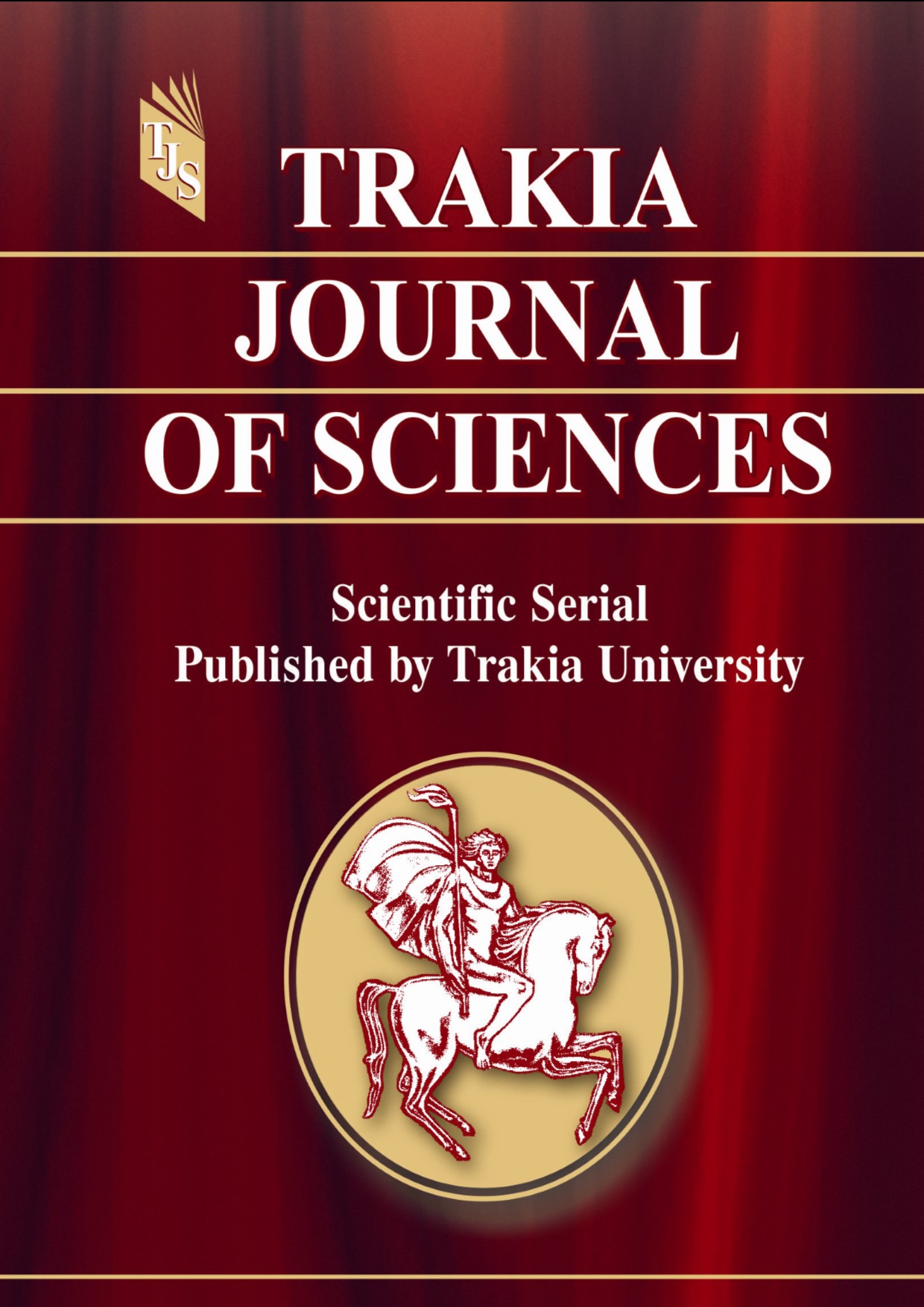THE BIOFLAVONOID FUSTIN ISOLATED FROM COTINUS COGGYGRIA HEARTWOOD ALLEVIATES TRINITROBENZENESULFONIC ACID-INDUCED COLITIS IN RATS BY SUPPRESSION OF NF-κB SIGNALLING PATHWAYS
DOI:
https://doi.org/10.15547/tjs.2025.01.004Keywords:
flavonoid, fustin, Cotinus coggygria, TNBS, colitisAbstract
PURPOSE: To assess the impact of 20 mg/kg orally administered fustin on colon histology and immunohistochemical expression of nuclear factor kappa B (NF-κB) in 2,4,6-trinitrobenzenesulfonic acid (TNBS)-induced colitis model in rats. METHODS: Cotinus coggygria heartwood was used to obtain fustin and then the substance was purified. There were three groups of Wistar rats – Control, TNBS and TNBS+F20. To induce colitis, 10 mg TNBS was applied rectally. Control rats were applied saline rectally. Fustin (20 mg/kg) was administered daily orally for 8 days to animals from TNBS+F20 group while the other groups received the vehicle for fustin. At the end of the experiment, colon samples were collected and the histological changes in the colon were investigated under light microscopy after staining with hematoxylin-eosin. Polyclonal antibodies were utilized to determine the expression of NF-κB immunohistochemically. RESULTS: In the TNBS group, histological analysis revealed widespread epithelial destruction, inflammatory infiltration throughout all layers of the colon wall, and localized oedema, along with a significant increase in cytoplasmic NF-κB expression compared to the Control group (p<0.001 vs. Control). Fustin treatment significantly lowered the microscopic scores for epithelial destruction (p<0.001 vs. TNBS), colonic inflammatory infiltration (p<0.01 vs. TNBS), and oedema (p<0.01 vs. TNBS). Additionally, immunohistochemical expression of NF-κB was notably reduced in the fustin-treated group (p<0.001 vs. TNBS). CONCLUSIONS: The Cotinus coggygria-derived flavonoid fustin, orally administered at a dose of 20 mg/kg, was effective in mitigating the microscopic and immunohistochemical signs of TNBS-induced colitis.
References
Kai, N., Qingsong, C., Kejia, M., Weiwei, L., Xing, W., Xuejie, C., Lixia, C., Minzi, D., Yuanyuan, Y. and Xiaoyan, W., An inflammatory bowel diseases integrated resources portal (IBDIRP). Database (Oxford), 2024:baad097, 2024.
Baydi, Z., Limami, Y., Khalki, L., Zaid, N., Naya, A., Mtairag, E. M., Oudghiri, M. and Zaid, Y., An update of research animal models of inflammatory bowel disease. TheScientificWorldJournal, 2021:7479540, 2021.
Alshehri, S., AlGhamdi, S. A., Alghamdi, A. M., Imam, S. S., Mahdi, W. A., Almaniea, M. A., Hajjar, B. M., Al-Abbasi, F. A., Sayyed, N. and Kazmi, I., Protective effect of fustin against adjuvant-induced arthritis through the restoration of proinflammatory response and oxidative stress, PeerJ, 11:e15532, 2023.
Georgieva, A., Pavlov, D., Tzaneva, M., Novakovic, M., Tesevic, V., Reyzov, M., Eftimov, M., Todorova, M., Nikolova, M., Stefanova, N. and Valcheva-Kuzmanova, S., Gastroprotective effect of the flavonoid fustin isolated from Cotinus coggygria heartwood in a rat model of indomethacin-induced gastric ulceration, ASN, 10(2):25-38, 2023.
Gospodinova, Z., Antov, G., Novaković, M., Tešević, V., Krasteva, N., Pavlov, D. and Valcheva-Kuzmanova, S., Antiproliferative activity of natural flavonoid fustin isolated from the heartwood of Cotinus coggygria scop. against breast and colon cancer cell lines. Acta Med Bulg, 50(1):27-33, 2023.
Morris, G. P., Beck, P. L., Herridge, M. S., Depew, W. T., Szewczuk, M. R., and Wallace, J. L., Hapten-induced model of chronic inflammation and ulceration in the rat colon. Gastroenterology, 96(3):795–803, 1989.
Qin, H. Y., Xiao, H. T., Wu, J. C., Berman, B. M., Sung, J. J. and Bian, Z. X., Key factors in developing the trinitrobenzene sulfonic acid-induced post-inflammatory irritable bowel syndrome model in rats. World J Gastroenterol, 18(20):2481-92, 2012.
Van Deventer, S.J., Tumour necrosis factor and Crohn's disease. Gut, 40(4):443-48, 1997.
Kimura, H., Hokari, R., Miura, S., Shigematsu, T., Hirokawa, M., Akiba, Y., Kurose, I., Higuchi, H., Fujimori, H., Tsuzuki, Y., Serizawa, H. and Ishii, H., Increased expression of an inducible isoform of nitric oxide synthase and the formation of peroxynitrite in colonic mucosa of patients with active ulcerative colitis. Gut, 42(2):180–87, 1998.
McKenzie, S. J., Baker, M. S., Buffinton, G. D. and Doe, W. F., Evidence of oxidant-induced injury to epithelial cells during inflammatory bowel disease. J Clin Invest, 98(1):136–41, 1996.
Grisham, M. B. and Yamada, T., Neutrophils, nitrogen oxides, and inflammatory bowel disease. Ann N Y Acad Sci, 664:103–15, 1992.
Grisham, M. B., Oxidants and free radicals in inflammatory bowel disease. Lancet, 344:859-61, 1994.
Keshavarzian, A., Banan, A., Farhadi, A., Komanduri, S., Mutlu, E., Zhang, Y. and Fields, J. Z, Increases in free radicals and cytoskeletal protein oxidation and nitration in the colon of patients with inflammatory bowel disease. Gut, 52(5):720–28, 2003.
Kubes, P. and Mc Cafferty, D.M., Nitric oxide and intestinal inflammation. Am J Med, 109(2):150-58, 2000.
Alican, I. and Kubes, P., A critical role for nitric oxide in intestinal barrier function and dysfunction. Am J Physiol, 270(2 Pt 1):G225-37, 1996.
Hu, L. H., Liu, J. Y. and Yin, J. B., Eriodictyol attenuates TNBS-induced ulcerative colitis through repressing TLR4/NF-kB signaling pathway in rats. Kaohsiung J Med Sci, 37(9):812-18, 2021.
Vezza, T., Rodríguez-Nogales, A., Algieri, F., Utrilla, M. P., Rodriguez-Cabezas, M. E. and Galvez, J. Flavonoids in inflammatory bowel disease: a review. Nutrients, 8(4):211, 2016.
Sinha, K., Sadhukhan, P., Saha, S., Pal, P. B. and Sil, P. C., Morin protects gastric mucosa from nonsteroidal anti-inflammatory drug, indomethacin induced inflammatory damage and apoptosis by modulating NF-κB pathway. Biochim Biophys Acta, 1850(4):769–83, 2015.
Xue, J. C., Yuan, S., Meng, H., Hou, X. T., Li, J., Zhang, H. M., Chen, L. L., Zhang, C. H. and Zhang, Q. G., The role and mechanism of flavonoid herbal natural products in ulcerative colitis. Biomed Pharmacother, 158:114086, 2023.
Ni, J., Wu, G. D., Albenberg, L. and Tomov, V. T., Gut microbiota and IBD: causation or correlation?. Nat Rev Gastroenterol Hepatol, 14(10), 573–84, 2017.
Kim, G., Jang, M., Hwang, I., Cho, J. and Kim, S, Radish sprout alleviates DSS-induced colitis via regulation of NF-kB signaling pathway and modifying gut microbiota. Biomed Pharmacother, 144:112365, 2021.

Downloads
Published
Issue
Section
License
Copyright (c) 2025 Trakia University

This work is licensed under a Creative Commons Attribution-NonCommercial 4.0 International License.


